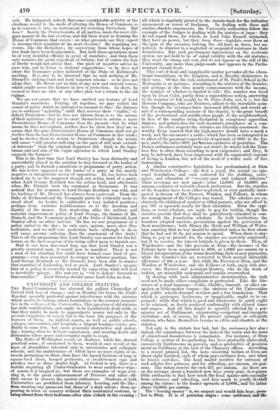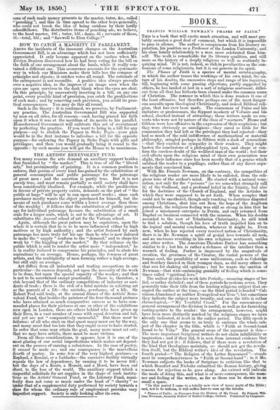- UNIVERSITY AND COLLEGE STATUTES.
THE Royal Commission has alarmed the gallant Chancellor of Oxford with fear of change ; and on Monday his Grace the Field- Marshal specially protested against interference with the statutes which secure to various school foundations in the country immuni- ties in the colleges of the Universities. This question of old statutes has wide ramifications, and ought to be legislatively dealt with, so that they might be made to approximate nearer not only to the present exigencies of society but to the bone. fide purposes of the framers of them. In judicial courts, as well as public schools, colleges, universities, and hospitals, a lingual bondage exists, pro- fitable to some few, but more generally obstructive and annoy- ing; teasing often to delicate consciences, and creating doubt and dissension where peace and certainty ought to reign. The Duke of Wellington recoils at shadows, -while his shrewd practical sense, if awakened to them, would at once revolt at the mass of absurdities tolerated only in universities and collegiate schools; and the maintenance of which have no more rights or in- terests pertaining to them than have the lapsed feshions of long or square-toed shoes, hooped petticoats, or swallow-nest caps and perukes two or three stories high. At Oxford to wit, there is a statute requiring all Under-Graduates to wear cauliflower wigs : of course it is laughed at ; but there are examples of wags revi- ving it, to the great embarrassment of Proctors and other offi- cials sworn to observe the ancient ordinances. Students at both Universities are prohibited from falconry, hunting, and the like; fromwearing any garments but those of a dark colour; from ap- pearing town. or country without their academical costume, or gibeent from their bedrooms after nine o'clock in the evening :
all which is regularly printed in the statute-book for the initiative amusement or terror of freshmen. In denting with these and similar obsolete enactments, the University authorities follow the example of the Judges in dealing with the statutes at large : they do not repeal them, for which, as Lord John Russell intimated, they have no power, but they bury them—legislate over them on the spur of the occasion, leaving the old laws in force, but un- noticed, to slumber in a neglected or suspended existence in their dormitories. But such pro-tempore innovations on the academic system are not held to be of equal validity with the old statutes; they want the stamp and seal, and do not appear on the roll of the University, any more than ju.dge-made law appears in the Parlia- mentary statute-book.
This sort of dead and inapplicable matter pervades all the educa- tional foundations in the kingdom, and is directly obstructive to their uses. Of this the rich endowment of St. Paul's School in the Metropolis is an instance. According to the statutes of the founder, • and perhaps at the time nearly commensurate with the income, the number of scholars is limited to 153: this number was fixed upon by Dean Colet, partly from a superstitious notion, answering to the number of fish caught by St. Peter (John xxi. ); but the Mercers Company, who are Trustees, adhere to the statutable num, ber though the revenues have increased fiftyfold, and would ad- - nri; of a corresponding increase of the charity, to the great benefit of the professional and middle-class people of the neighbourhood, in lieu of the surplus being dissipated in sumptuous apposition dinners, and guinea-fees for each member's attendance on a com- mittee. In other respects the statutes are liberally construed: the worthy Dean enacted that the high-master should have a mark a week, and the sur-master a noble ; which has been so interpreted as to allow of the payment respectively of upwards of 600/. to the for- mer, and to the latter 300/. per tinnum exclusive of gratuities. The Dean's ordinare,,es certainly were not strict ; he wisely left the Tres- tees free to alter them according to new exigencies ; and they, it may be inferred, have been impressed with the augmented expense " of living in London, but not of the need of a wider scale of free
instraction. -
A similar constructive legislation has predominated at Eton and Winchester Colleges—the first a royal, the second an epic-, copal foundation, a.nd each endowed, for the clothing, suste- nance, and education of "seventy poor and indigent scholars.' ' Their revenuste are now ample—some 12,0001. or 15,000I. per annum, exclusive of valuable church preferment. But the statutes of the founders have been either neglected, or very partially inter- preted in favour of the Provost, Warden, and Fellows, in whom the management of the Colleges was vested. The scholars are ex- clusively the children of opulent or titled parents, whe can afford to pay 70/. or upwards yearly for their education. Even the oppi- dans, or town scholars, are made to pay for tuition, :Though the, statutes provide that they shall-be gratuitously educated in com- mon with the foundation scholars.-. In both institutions the founders adopted anxious precautions against the perversion of their munificence ; both Henry the Sixth and William of Wyke- ham enacting that- no boy should be admitted unless he first swore that he had not 31. 6s. per annum to spend. When there is any- thing to pay or provide for, the statutes are narrowly construed; but if to receive, the utmost latitude is given to them. Thus, at Winchester—and the like prevails at Eton—the incomes of the- Fellows have been augmented to 500/. or 1,000/. per annum by a liberal interpretation of the terms describing their money payments while the founder's kin are restricted to their ancient statutable allowance of 40s. a year. But while the Provost at Eton, and the Warden at Winchester, and the Fellows at both, enjoy rich sine- cures, the Masters and Assistant-Masters, who do the work of tuition, are miserably underpaid and cruelly overworked. In denTi g with such administrative monstrosities, the task need not be made either complicate or protracted. Like the lite- rature of a dead language—Celtic, Chaldee, &merit, or other un- spoken or little-spoken tongue—the statutes of the Universities and public schools demand revision and a free translation. That 'which is grotesque, barbarous, or inapplicable, ought to be ex- punged ; while that which is good and wholesome in spirit ought to be retained, or freely rendered conformably with altered times and usages. And all this might be speedily effected by a per- missive act of Parliament, empowering competent• and energetic visitation—not, of course, by the present episcopal or collegiate visiters, who have themaelies become as effete and obsolete as the statutes.
Not only is the statute law bad, but the customary law also indeed, the coincidence between the laws of the realm and the laws of educational foundations is remarkable. For instance, at Eton College a system of fee-gathering has been gradually elaborated, excessively burdensome on parents, and as productive of precious metal as California or the best of the Chancery offices. According to a recent printed list, the boys receiving tuition at Eton are about eight hundred, each of whom pays entrance-fees, and when he leaves exit-fees. The head master receives for entrance of each scholar five guineas and for schooling, per annum, six gui- neas. The tutors receive for each 21/. per annum. As there are on the average about a hundred new boys every year, it requires little arithmetic to find how much the head master nets annually from entrances and schooling, and how much is yearly divided among the tutors : to the former upwards of 5,0001., and the latter above 15,0001. per annum.
The "leaving money" is, we suspect and would fain hope, pecu- liar to Eton. It is of patrician origin : some noblemen and the sons of such made money presents to the master, tutor, &c., called " pouching "; and this in time spread to the other boys generally, who could not brook the idea of being outdone by their lordly schoolfellows. The distributive items of pouching are, we believe, to the head master, 10/. • tutor, 151.; dame, 5/. ; servants of these, 51.—total, 351.; and "farewell to Eton College !"



























 Previous page
Previous page